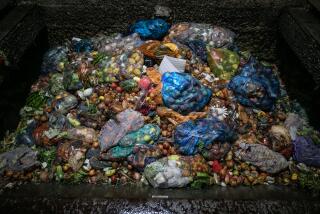Europe Leading the Way in Solving Toxic Waste Problem, Study Finds
- Share via
WASHINGTON — While American industry and government have been simply moving toxic waste problems from one place to another, Europe has been effective in reducing them at their sources, a new report says.
Europeans are far ahead in the handling of toxic chemicals because they have been “reconceiving the hazardous-waste challenge as one of chemical engineering rather than one of dirt-moving,” according to the authors, Bruce W. Piasecki and Gary A. Davis.
The wastes in question are not ordinary garbage, but the poisonous chemicals and metals produced by industry.
Though European methods of waste-handling differ, they all feature greater government involvement in the regulation of industrial processes, Davis and Piasecki say in their book, “America’s Future in Toxic Waste Management: Lessons from Europe.”
University Scholars
Davis is a research associate at the University of Tennessee in Knoxville and Piasecki is a professor at Clarkson University, Potsdam, N.Y. They were in Washington last week to brief congressional staffers on the conclusions distilled from their four-year study.
They said that, because of a scarcity of land and high dependence on ground water, European countries were skeptical of landfills far earlier than U.S. authorities.
It was not until 1984 that Congress moved to restrict landfill waste disposal in the United States. The restrictions still are being put into place by the Environmental Protection Agency.
Piasecki and Davis contrast this slow-moving approach to steps taken by Europeans.
The West German state of Hesse, for example, recently forced a chemical plant that was discharging hydrochloric acid into the Main River to install an acid-recovery process.
Sweden and Finland are following Denmark in forming government companies to handle hazardous wastes, the book says. A French government agency, meanwhile, makes grants to private waste companies.
Public entities have taken large ownership positions in waste handling facilities in Austria and the Netherlands.
New ‘Utilities’ Suggested
For the United States, the book advocates creation of “waste public utilities” on the model of electric and gas utilities, with proscribed territories and rates that guarantee a reasonable return on investment. Tightening landfill regulations will “create a market for alternatives,” the authors noted.
Arizona is building a state-sponsored plant that will be privately operated, but without the monopoly that a public utility has, they said.
They also recommended greater use of mobile treatment facilities, such as mobile incinerators, without the need for a new permit at each site.
The European systems are far from fool-proof, the book says. West German officials report, for example, the existence of “a lucrative waste traffic to East Germany and other countries.”
More to Read
Sign up for Essential California
The most important California stories and recommendations in your inbox every morning.
You may occasionally receive promotional content from the Los Angeles Times.













